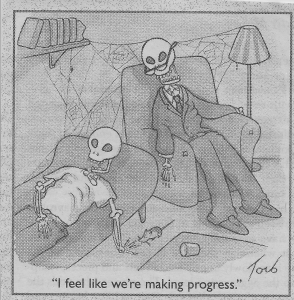
Tens of millions of people go to one form of psychotherapy or another because they want:
- To be happier
- To escape their anxieties and fears
- To create a happy romantic partnership
- To find their life purpose and feel satisfied
And when I look at the results I reach the conclusion that most therapy fails. It’s not your fault—it’s the therapeutic model. It’s flawed.
Have you been to therapy? And are you as happy as you could be? Do you live without anxiety and fear? Are you in a wonderful and deeply nourishing romantic partnership that is easy and playful? Have you discovered your life purpose and are you experiencing a continual sense of satisfaction?
I know very few people who answer, “yes” to those questions—very few. Sure, you may be better off today than when you started therapy, but why aren’t the results more dramatic?
It is possible for therapy to produce significantly greater results than what most people have become accustomed to.
I wish I’d known this 20 years ago!
I’ve been counseling people for over twenty years. Based on what my clients tell me, over 94% have found the process of working with me to be very helpful. Yet, I’ve limited my effectiveness—and therefore limited the results my clients achieved—because I didn’t previously know what I’m sharing with you in this article.
By the way, no refunds on previous work, but I will offer all previous clients a copy of my next book for free. This book will go into detail about why most forms of therapy are limited and how to break out of those limitations. By creating a new model, I believe it is realistic for many people (not everyone) to achieve:
- Consistent happiness
- A life with hardly any anxiety and only experiencing fear if you are in physical danger
- A happy romantic partnership that deepens and becomes richer over time
- Clarity about your life purpose—and satisfaction if you become good at what you do
Today, I am starting a new conversation.
This will be the primary focus of several new articles in the coming months. We are considering, but haven’t yet decided whether or not to create a forum in which you can participate in this conversation. Right now we’re looking into the technology, trying to find the best way to make this happen. If you’d like to join a forum, click here to send me an email.
This conversation is for people serious about change. It is for people who have attempted various ways to improve your lives, and although you may have chipped away at some of your armor, learned to be a bit less reactive and less anxious—you aren’t fulfilling your potential and you know it.
So, here’s the starting point of this conversation.
Most therapy doesn’t work because it emphasizes the reasons why we are not okay . . . we were abused . . . we were timid . . . we weren’t loved . . . we were rejected . . . our hearts were broken . . . our dreams were dashed. And even “outcome oriented” therapies—therapies that look forward instead of back—they too reify our ideas and beliefs.
 To reify an idea or a concept is to regard it as real. We define ourselves with these ideas—as if pouring bronze into a mold and creating a rigid statue. This is a huge mistake. And then spending years talking about the ways we have defined ourselves reinforces our definitions.
To reify an idea or a concept is to regard it as real. We define ourselves with these ideas—as if pouring bronze into a mold and creating a rigid statue. This is a huge mistake. And then spending years talking about the ways we have defined ourselves reinforces our definitions.
Therapists unknowingly do this all the time. A female client comes in saying something like, “When I was a child my father abandoned me and so now I’m very cautious of really opening myself up to be in a relationship with a man.” The therapist sincerely says, “I’m so sorry that happened. It’s really hard to open up and trust again after we’ve been hurt or abandoned.”
A male client comes in and says, “My wife shamed me last week by telling me that she doesn’t think I love her because I’m no longer the sexual partner I used to be.” And the therapist, again, sincerely says, “That must have been very hard to hear. I’m sure your wife meant well and at least she’s expressing her feelings. That’s a good start.”
Therapists have good intentions.
Of course the therapist is trying to be helpful, but the problem is that the therapist is doing two things—neither of which are helpful. I want to focus on one of those two things, which is that the therapist is reinforcing ideas such as “it’s hard to trust again,” or “that our partner can shame us.” Neither of these are necessarily true. It all depends on how we make meaning.
And that’s the point of leverage in our lives and in therapy—learning how to make meaning in constructive ways. Coming to understand that meaning is malleable. Beliefs are made up. Thoughts are made up—they have no inherent, fixed meaning—yet most forms of therapy act as if they do.
Based on the ways we think and communicate, we have poured ourselves into molds that are way too limiting. And, there is a way out. That’s what this series of articles, and a possible forum, will be focusing on for the next few months.
If you have a good friend that you care about, I invite you to share this article with them so that they can participate in this conversation and accompany you on a journey that I sincerely believe has the strong potential to radically change your life.

No comments yet.